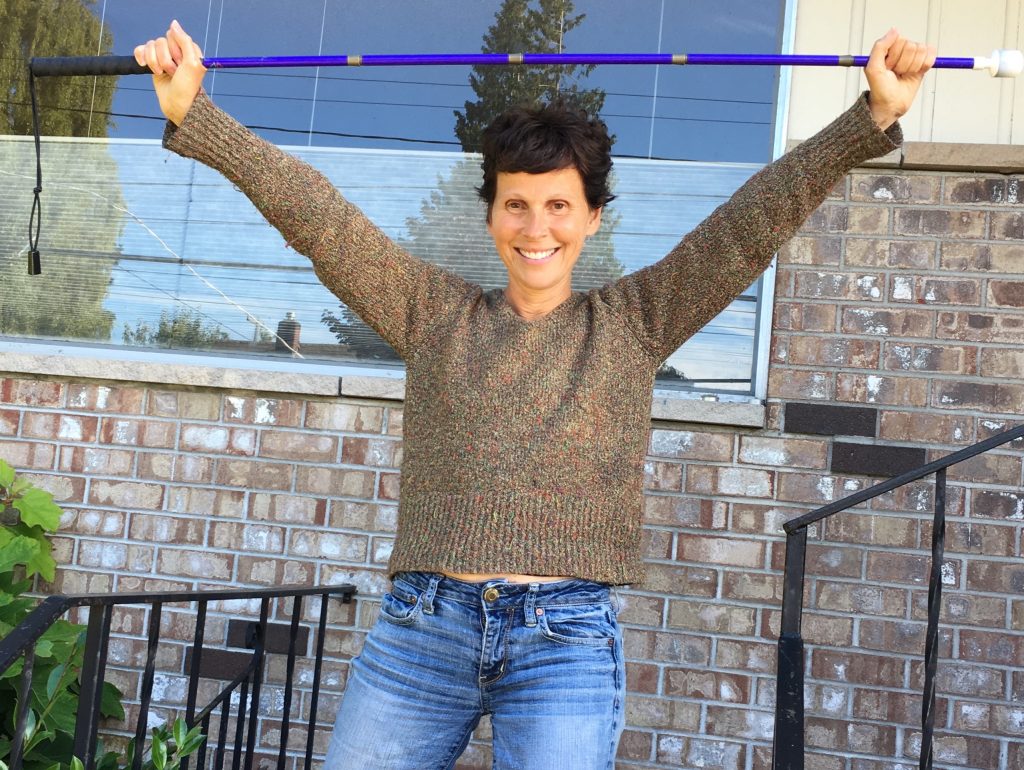 The meaning of these words hit me a couple of months ago when I was in the depths of despair over my eyesight challenges. It came after a trip to San Francisco to try out a new technology that I was convinced would help me navigate my neighborhood. Instead, it was a complete bust and I was handed a white cane—the universal symbol for blindness that has traumatized me ever since I was diagnosed with RP fifteen years ago.
The meaning of these words hit me a couple of months ago when I was in the depths of despair over my eyesight challenges. It came after a trip to San Francisco to try out a new technology that I was convinced would help me navigate my neighborhood. Instead, it was a complete bust and I was handed a white cane—the universal symbol for blindness that has traumatized me ever since I was diagnosed with RP fifteen years ago.
The white cane represented everything I stood to lose and was so terrifying that I had nightmares over it and vowed I would never get to the point that I would have to touch one. Yet there I was, fumbling through downtown San Francisco with a mobility trainer calling out instructions from behind me, and a long white cane swiping the sidewalk in front of me––all while fighting back tears and the urge to smash that cane into whatever obstacle I encountered.
I’ve always believed I could create my own destiny and that if I put enough energy and focus into something I wanted, it would materialize. But despite doing everything in my power to save my eyesight, my efforts—at least for now—haven’t been enough.
I returned from San Francisco so devastated by my current reality it was hard to pull myself off the floor. Losing eyesight isn’t fun and it has flattened me plenty of times over the past year. But the white cane made my inability to see the faces of my husband and two daughters seem so final. And the pain that thought generated was so crushing I wasn’t sure how to go on. At the same time, I have always been a glass half (or even mostly) full kind of person and somewhere amid my despair, I remembered the words my Dad has always lived by: You never know what you can accomplish as long as you keep on going; As soon as you quit, you have your answer. It hit me that the darkness—both literal and emotional— was only final if I allowed it to be. I realized that I, like anyone struggling with adversity, had a choice: I could keep wallowing in my cocktail of grief, fear, anger and loss, or pull myself together, stand back up and harness the enormous amount of energy I was exerting into something powerful.
That’s when I asked my daughter, Sydney, to order a purple mobility cane for me—white will never be my color—and dubbed it Purple Power. The day after it arrived, I forced myself to hit the streets in my Seattle neighborhood. It took a few blocks to get the hang of it. But between Purple Power and the GPS apps on my iPhone, I was able to walk the mile to the office I share with my husband alone for the first time in months.
I don’t want to have to use a cane to navigate my world—even if it is a hip shade of purple. But I realize that I can let that stick take my energy and power or use it to empower me. And until my eyesight is restored, I’m putting it to work.
To me, harnessing adversity means shifting our attention from fear and loss to passion and joy. It means replacing the word “weakness” with “strength”. It means shedding limits and thinking big. As my favorite inspirational author, Dr. Joe Dispenza says, “Bless our challenges that they initiate us into greatness”.
I recently shared my journey with my eyesight struggles and the ways I am working to harness my adversity in a talk I gave to educators. I wanted to share it here in hopes that it gives you a boost and ideas for how you can harness your eyesight struggles.
I know that if we all turn our adversity on its head, we can create magic.
To listen to my Harnessing Adversity talk, click on the media player below.


Leave a Reply